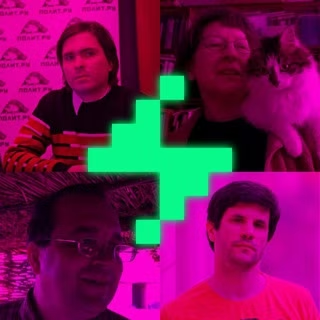⚡️Linguistic alerts/лингвистические оповещения
Channel

452
subscribers
Агрегатор лингвоновостей для русскоязычного сегмента Телеграма
Конференции, публикации, подборки литературы
По всем вопросам: @lingalerts_bot
Articulation of the tongue back in American English and Seoul Korean
https://digitalrepository.unm.edu/cgi/viewcontent.cgi?article=1093&context=ling_etds
#phonetics
https://digitalrepository.unm.edu/cgi/viewcontent.cgi?article=1093&context=ling_etds
#phonetics
Новые Вопросы языкового родства!
jolr.ru
Irnanda, Septhia Acehnese: The dating of Into-Sumatra migration - p. 3-20
Kogan, Anton On the etymological stratification of borrowed Indo-Iranian vocabulary in Burushaski - p. 21-42
Armand, Elena Reflexes of Old Iranian preverbs in the Shughni language [In Russian] - p. 43-74
Badeev, Artyom Demonstrative pronouns in Old Iranian languages: main types of usage and the reconstruction of the Proto-Iranian system [In Russian] - p. 75-105
Kharkov, Vladimir N.; Urmanchieva, Anna Y.; Kolesnikov, Nikita A. Population genetics and comparative linguistics: phylogeny and phylogeography of haplogroup N1a2b and the linguistic prehistory of the Samoyed peoples [In Russian] - p. 109-130
Sumbatova, Nina Correspondences of post-uvular consonants in Dargwa languages [In Russian] - p. 131-161
Zhivlov, Mikhail Hokan I: A review of comparative studies - p. 162-188
jolr.ru
Irnanda, Septhia Acehnese: The dating of Into-Sumatra migration - p. 3-20
Kogan, Anton On the etymological stratification of borrowed Indo-Iranian vocabulary in Burushaski - p. 21-42
Armand, Elena Reflexes of Old Iranian preverbs in the Shughni language [In Russian] - p. 43-74
Badeev, Artyom Demonstrative pronouns in Old Iranian languages: main types of usage and the reconstruction of the Proto-Iranian system [In Russian] - p. 75-105
Kharkov, Vladimir N.; Urmanchieva, Anna Y.; Kolesnikov, Nikita A. Population genetics and comparative linguistics: phylogeny and phylogeography of haplogroup N1a2b and the linguistic prehistory of the Samoyed peoples [In Russian] - p. 109-130
Sumbatova, Nina Correspondences of post-uvular consonants in Dargwa languages [In Russian] - p. 131-161
Zhivlov, Mikhail Hokan I: A review of comparative studies - p. 162-188
⚡️Linguistic alerts/лингвистические оповещения
Photo
Ото-мангская глава от Кофмана
+ ещё одна глава про ЮА в хэндбуке этой серии (предыдущая)
+ ещё одна глава про ЮА в хэндбуке этой серии (предыдущая)
De Gruyter
53 Uto-Aztecan
53 Uto-Aztecan was published in The Languages and Linguistics of Indigenous North America on page 1333.
Ждём новый хэндбук по Мексике и северу Центральной Америки
16 декабря!
Пока можете посмотреть на содержание
16 декабря!
Пока можете посмотреть на содержание
Introduction: Towards a comparative historical dialectology
https://historicalsyntax.org/hs/index.php/hs/issue/view/71
#historical_linguistics
https://historicalsyntax.org/hs/index.php/hs/issue/view/71
#historical_linguistics
Semantic variation and semantic change in the color lexicon
https://www.degruyter.com/document/doi/10.1515/ling-2023-0161/html
https://www.degruyter.com/document/doi/10.1515/ling-2023-0161/html
De Gruyter
Semantic variation and semantic change in the color lexicon
Color terms show a remarkable variation in their possible lexicalization patterns across different languages. In the literature, the interest has been especially to describe the color lexicon of a certain language and to determine whether it may abide or…
https://www.academia.edu/125367452/How_North_Saami_phonology_challenges_fundamental_assumptions_in_phonological_theory
#phonology
#phonology
www.academia.edu
How North Saami phonology challenges fundamental assumptions in phonological theory
To adapt the now well-known term “basic linguistic theory” (BLT), one can claim that there is a theoretical and methodological construct that could be called “basic phonological theory”: a set of traditional and well-established assumptions and
Sidwell, Paul and Mark Alves. 2023. Re-Evaluating Shorto's MKCD Reconstructions. In Paul Sidwell & Mark Alves (eds.) Papers from the Ninth and Tenth International Conference on Austroasiatic Linguistics. JSEALS Special Publication No. 12. Manoa, University of Hawaii Press.
Sidwell, Paul. 2024. 500 Proto Austroasiatic Etyma: Version 1.0. Journal of the Southeast Asian Linguistics Society 17.1:i-xxxii
#historical_linguistics
Sidwell, Paul. 2024. 500 Proto Austroasiatic Etyma: Version 1.0. Journal of the Southeast Asian Linguistics Society 17.1:i-xxxii
#historical_linguistics
🔥🔥🔥🔥🔥🔥🔥🔥🔥🔥🔥🔥
ОЧНЫЙ ДОКЛАД СИДВЕЛЛА В ВШЭ
6-го декабря в Центре компаративистики и филогенетики Института классического Востока и античности НИУ ВШЭ в рамках пленарного заседания Ностратического семинара им. В. М. Иллич-Свитыча состоится очный доклад проф. Пола Сидвелла (Сиднейский университет, Австралия), крупнейшего специалиста по австроазиатским языкам и другим языковым семьям Юго-Восточной Азии, на тему «Моделирование предыстории и развития языковой семьи на примере австроазиатской филы» (аннотация доклада на английском языке приложена ниже).
Доклад ориентировочно состоится в 18:30 в ИКВИА (ул. Старая Басманная 21/4, стр. 3, корпус «Л», 2-й этаж, ауд. Л-209; в случае изменения точного времени или места будет сообщено дополнительно). Для прохода в здание ВШЭ необходимо не позднее 4 декабря зарегистрироваться по ссылке: https://forms.yandex.ru/u/67363bdbd04688fa06869408/
Краткая аннотация доклада:
Dr. Paul Sidwell (Honorary Associate, Sydney University, Australia)
Modelling the prehistory and evolution of a language family: lessons from Austroasiatic
The Austroasiatic (AA) phylum is the principal language substrate of Mainland Southeast Asia, its periphery extending to the Malay peninsula, India, and southern China. It comprises around 170 languages in some 14 branches, and its origins can be confidently located in the regional transition to rice and millet farming of the late Neolithic. In this talk I will briefly review the history of the field, drawing lessons on methodological and theoretical approaches, and how these informed my own work. I will also summarise my reconstruction of proto-AA phonology, lexicon, morpho-syntax, and culture/homeland.
Comparative-historical studies of AA began more than a century, and diverse efforts by scholars have brought us to where we can now discuss many aspects of Austroasiatic language history with confidence, including proto-Austroasiatic itself (e.g. see Sidwell & Alves 2023, Sidwell 2024 for phonological reconstruction and 500 word proto-lexicon). Progress in AA comparative-historical work has proceeded in waves, with a significant period of progress from the late 1950s to late 1970s that laid the analytical groundwork, followed by a phase of more recent progress in the 21st century as significant improvements in data availability and information technology transformed working methods and productivity.
This latter period saw qualitative changes and theoretical advancements. We became more aware and understanding of various linguistic phenomenon, such as the use of phonation types and contour tones in various languages, posing new challenges for phonological reconstruction. There also emerged a more informed typology of syllable structures, and interactions between levels of structure, that was absent in early decades. Nonetheless, our current model of proto-AA is essentially one that we could largely have arrived at half a century ago, given the data and theoretical understandings of that time, but various factors aligned to hold back progress.
The story of AA comparative-historical linguistics is largely characterized by uncoordinated and highly idiosyncratic efforts. Scholars pursued various inductive and deductive approaches with significant consequences. Bayesian reasoning, comparing the relative strength of competing claims/analyses, was largely absent from the discourse, leading to numerous irreconcilable claims, especially since the 1970s. Better research coordination, data sharing, and overall transparency are vital and made much easier in the present era of the internet and inexpensive information technology, yet the human factor remains both an asset and a limitation in comparative work.
ОЧНЫЙ ДОКЛАД СИДВЕЛЛА В ВШЭ
6-го декабря в Центре компаративистики и филогенетики Института классического Востока и античности НИУ ВШЭ в рамках пленарного заседания Ностратического семинара им. В. М. Иллич-Свитыча состоится очный доклад проф. Пола Сидвелла (Сиднейский университет, Австралия), крупнейшего специалиста по австроазиатским языкам и другим языковым семьям Юго-Восточной Азии, на тему «Моделирование предыстории и развития языковой семьи на примере австроазиатской филы» (аннотация доклада на английском языке приложена ниже).
Доклад ориентировочно состоится в 18:30 в ИКВИА (ул. Старая Басманная 21/4, стр. 3, корпус «Л», 2-й этаж, ауд. Л-209; в случае изменения точного времени или места будет сообщено дополнительно). Для прохода в здание ВШЭ необходимо не позднее 4 декабря зарегистрироваться по ссылке: https://forms.yandex.ru/u/67363bdbd04688fa06869408/
Краткая аннотация доклада:
Dr. Paul Sidwell (Honorary Associate, Sydney University, Australia)
Modelling the prehistory and evolution of a language family: lessons from Austroasiatic
The Austroasiatic (AA) phylum is the principal language substrate of Mainland Southeast Asia, its periphery extending to the Malay peninsula, India, and southern China. It comprises around 170 languages in some 14 branches, and its origins can be confidently located in the regional transition to rice and millet farming of the late Neolithic. In this talk I will briefly review the history of the field, drawing lessons on methodological and theoretical approaches, and how these informed my own work. I will also summarise my reconstruction of proto-AA phonology, lexicon, morpho-syntax, and culture/homeland.
Comparative-historical studies of AA began more than a century, and diverse efforts by scholars have brought us to where we can now discuss many aspects of Austroasiatic language history with confidence, including proto-Austroasiatic itself (e.g. see Sidwell & Alves 2023, Sidwell 2024 for phonological reconstruction and 500 word proto-lexicon). Progress in AA comparative-historical work has proceeded in waves, with a significant period of progress from the late 1950s to late 1970s that laid the analytical groundwork, followed by a phase of more recent progress in the 21st century as significant improvements in data availability and information technology transformed working methods and productivity.
This latter period saw qualitative changes and theoretical advancements. We became more aware and understanding of various linguistic phenomenon, such as the use of phonation types and contour tones in various languages, posing new challenges for phonological reconstruction. There also emerged a more informed typology of syllable structures, and interactions between levels of structure, that was absent in early decades. Nonetheless, our current model of proto-AA is essentially one that we could largely have arrived at half a century ago, given the data and theoretical understandings of that time, but various factors aligned to hold back progress.
The story of AA comparative-historical linguistics is largely characterized by uncoordinated and highly idiosyncratic efforts. Scholars pursued various inductive and deductive approaches with significant consequences. Bayesian reasoning, comparing the relative strength of competing claims/analyses, was largely absent from the discourse, leading to numerous irreconcilable claims, especially since the 1970s. Better research coordination, data sharing, and overall transparency are vital and made much easier in the present era of the internet and inexpensive information technology, yet the human factor remains both an asset and a limitation in comparative work.
50 Years Comparative Philology Seminar, University of Oxford
On the occasion of the 50th anniversary of the Comparative Philology Seminar at Oxford, an afternoon celebration will take place on Tuesday 3rd December 2024 in the Sultan Nazrin Shah Auditorium at Worcester College, Oxford OX1 2HB.
Programme:
2.15pm - Welcome and reminiscences
2.30pm - Professor Daniel Kölligan (University of Würzburg), "On the development of future tenses"
3.30pm - Coffee break and social time
4.30pm - Professor David Langslow (University of Manchester), "Some species of family tree in the editing of a late Latin medical text"
5.30pm - Conclusion
Everybody is welcome.
(We would of course be particularly happy if former participants of the seminar were able to attend.)
The event, which is free of charge, will also be livestreamed. If you are intending to attend either in person or online, please register by 25th November 2024 by using the following link:
https://forms.office.com/e/jN0yVWFCGL
The link for the livestream will be sent to online attendees on the date of the event itself.
For any questions, please contact either of the organisers via e-mail (andreas.willi@ling-phil.ox.ac.uk / michele.bianconi@ling-phil.ox.ac.uk).
On the occasion of the 50th anniversary of the Comparative Philology Seminar at Oxford, an afternoon celebration will take place on Tuesday 3rd December 2024 in the Sultan Nazrin Shah Auditorium at Worcester College, Oxford OX1 2HB.
Programme:
2.15pm - Welcome and reminiscences
2.30pm - Professor Daniel Kölligan (University of Würzburg), "On the development of future tenses"
3.30pm - Coffee break and social time
4.30pm - Professor David Langslow (University of Manchester), "Some species of family tree in the editing of a late Latin medical text"
5.30pm - Conclusion
Everybody is welcome.
(We would of course be particularly happy if former participants of the seminar were able to attend.)
The event, which is free of charge, will also be livestreamed. If you are intending to attend either in person or online, please register by 25th November 2024 by using the following link:
https://forms.office.com/e/jN0yVWFCGL
The link for the livestream will be sent to online attendees on the date of the event itself.
For any questions, please contact either of the organisers via e-mail (andreas.willi@ling-phil.ox.ac.uk / michele.bianconi@ling-phil.ox.ac.uk).
Office
Please fill out this form
FPNAbstract_YeDurvasula.pdf
533.7 KB
Processing Nasality: Lexical Access or Phonological Inference
#phonetics
#phonetics
Midphon25Abstract_YeGu.pdf
183.3 KB
Is Nasalization Phonological or Co-articulatory in Chinese?
An Acoustic Study on Chengdu Dialect and Beijing Mandarin
#phonetics
An Acoustic Study on Chengdu Dialect and Beijing Mandarin
#phonetics
Telegram Center
Channel
